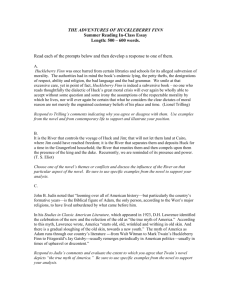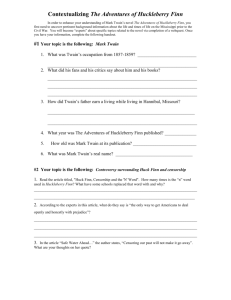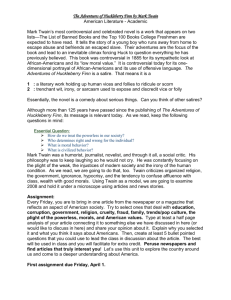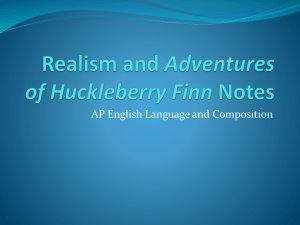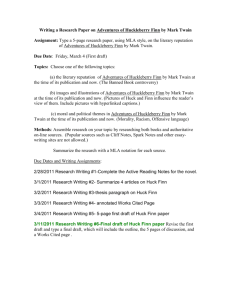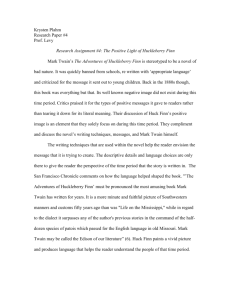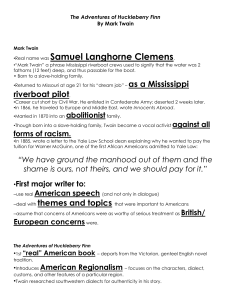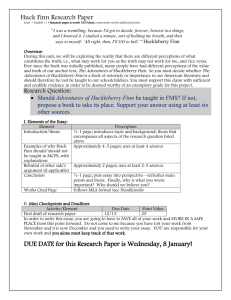AP English 11 2/14/15 Huck Finn Synthesis Essay The Adventures
advertisement
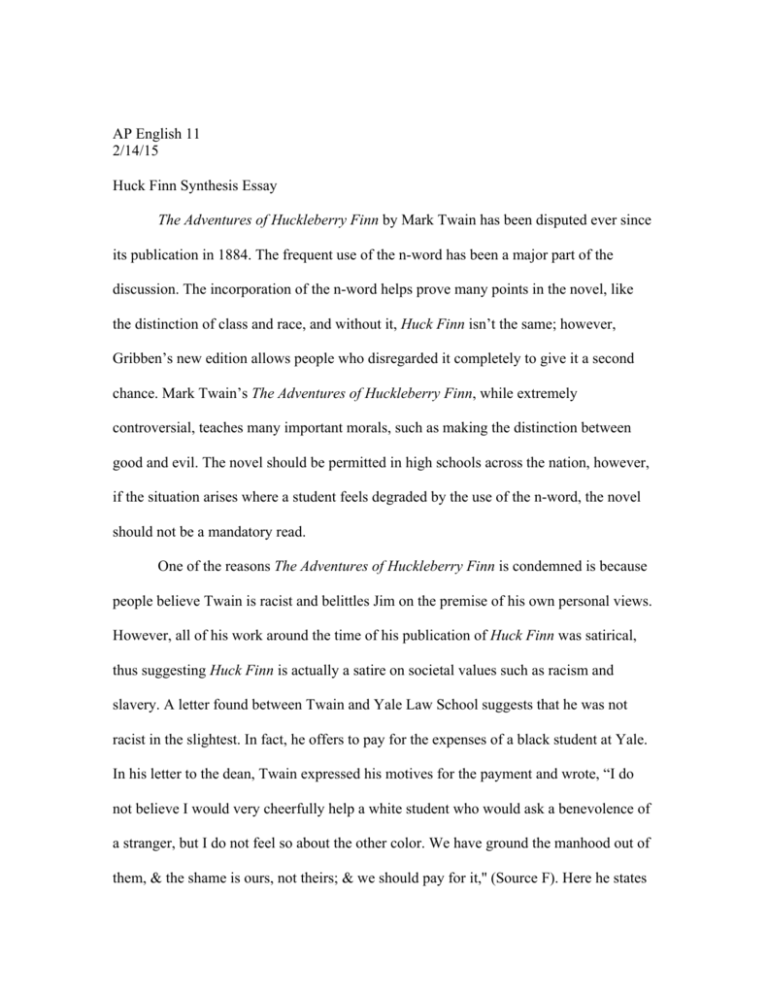
AP English 11 2/14/15 Huck Finn Synthesis Essay The Adventures of Huckleberry Finn by Mark Twain has been disputed ever since its publication in 1884. The frequent use of the n-word has been a major part of the discussion. The incorporation of the n-word helps prove many points in the novel, like the distinction of class and race, and without it, Huck Finn isn’t the same; however, Gribben’s new edition allows people who disregarded it completely to give it a second chance. Mark Twain’s The Adventures of Huckleberry Finn, while extremely controversial, teaches many important morals, such as making the distinction between good and evil. The novel should be permitted in high schools across the nation, however, if the situation arises where a student feels degraded by the use of the n-word, the novel should not be a mandatory read. One of the reasons The Adventures of Huckleberry Finn is condemned is because people believe Twain is racist and belittles Jim on the premise of his own personal views. However, all of his work around the time of his publication of Huck Finn was satirical, thus suggesting Huck Finn is actually a satire on societal values such as racism and slavery. A letter found between Twain and Yale Law School suggests that he was not racist in the slightest. In fact, he offers to pay for the expenses of a black student at Yale. In his letter to the dean, Twain expressed his motives for the payment and wrote, “I do not believe I would very cheerfully help a white student who would ask a benevolence of a stranger, but I do not feel so about the other color. We have ground the manhood out of them, & the shame is ours, not theirs; & we should pay for it,'' (Source F). Here he states how white men have wronged blacks in the past and it is their responsibility to make things right. It is clear through these sorts of statements and the payment for black student’s education that Twain was not actually racist and Huck’s narration and word choice, including the use of the n-word, all held a purpose to satirize the society at the time. As George Santayana once said, “Those who cannot remember the past are condemned to repeat it.” While the use of the n-word is offensive, it is a part of American history and essential to the plot and setting of the novel. Twain purposefully used the word despite it being vulgar; it is intended to instill an uncomfortable feeling in the reader. He could have used other terms such as “darky,” but the n-word brought about the most controversy and was necessary to properly convey society during that time period. In a USA Today article, Jeff Nichols said the diction choice in The Adventures of Huckleberry Finn was chosen to “convey the language and attitudes of Missouri in the 1840s, in a book written in the 1880s when Jim Crow laws were being passed in the South to deprive blacks of their civil rights,” (Source G). Twain wrote the novel when slavery had already been abolished, however, the setting of Huck Finn is Missouri during the 1840s, a place where slavery was ever so present. Twain’s uncomfortable use of the n-word evokes a lot more emotion from the reader than the word “slave” does. Censoring the novel sanitizes history and strips it of its truth and meaning. By editing the book to make it more “family-friendly” you are essentially attempting to rewrite history. In a comic by Matt Bors, Huck Finn and several other works of controversial literature are revised to be more socially acceptable (Source D). Bors pokes fun at the situation by showing how ridiculous it is to make revisions to these notorious novels. He jokingly writes that the Bible has been tweaked and now says “I’ll dang you Heck,” sayeth the Lord. On a serious note however, a revised version of The Adventures of Huckleberry Finn disregards the major point that Twain was trying to make. There is a lot of hatred and power behind the use of the n-word, and that is the point Twain is making. The fact that a young, poor, neglected white child is able to use such a horrible word and dehumanize an older black man is the absurdity behind it all. However, all the negative connotations that coincide with the n-word are still as present as they were in the 1840s. This is what makes The Adventures of Huckleberry Finn still controversial. If a student has a serious issue with the novel and feels degraded with the constant use of the n-word, they should not have to sit through multiple lessons of the agony. And for the schools that banned the novel entirely, the Gribben’s edition should not be overlooked. While it is definitely not the same and does not provoke the same emotions and reactions as Twain’s original piece, it gives people another chance to experience one of America’s classic novels and satires on “sivilized society.” Gribben argues that his revised edition is not for those who find no fault in the use of the n-word, but for those who in fact do. He claims that the replacement of the n-word with “slave” does not change Twain’s social critique. (Source G) The newly revised edition should be proposed to the libraries and schools who banned the original copy, but it should also be kept in mind that the meaning of the novel has diminished slightly. The Adventures of Huckleberry Finn has strong messages about slavery and the wrongs of society. Although the n-word makes the novel questionable, Twain was not in fact racist and tried to point out the flaws of those who were. The morals and history taught throughout the novel should be taught in high schools and not be neglected. It is best for the book to be taught to juniors and seniors who should be mature enough to read the language and assess the content appropriately. As for those who disapprove of the novel entirely, Alan Gribben’s revision of Huck Finn would provide a basic representation of Huck Finn. Excellent work! 9 (100%)
